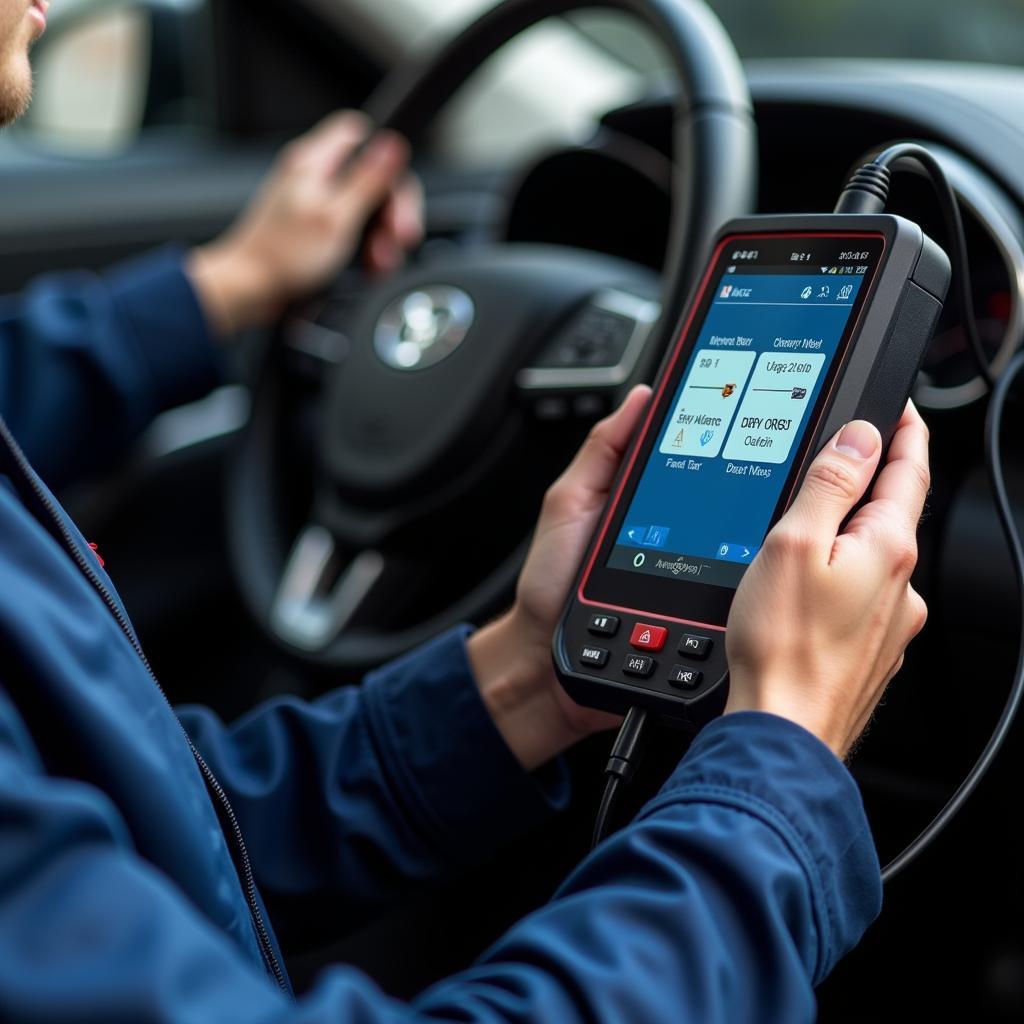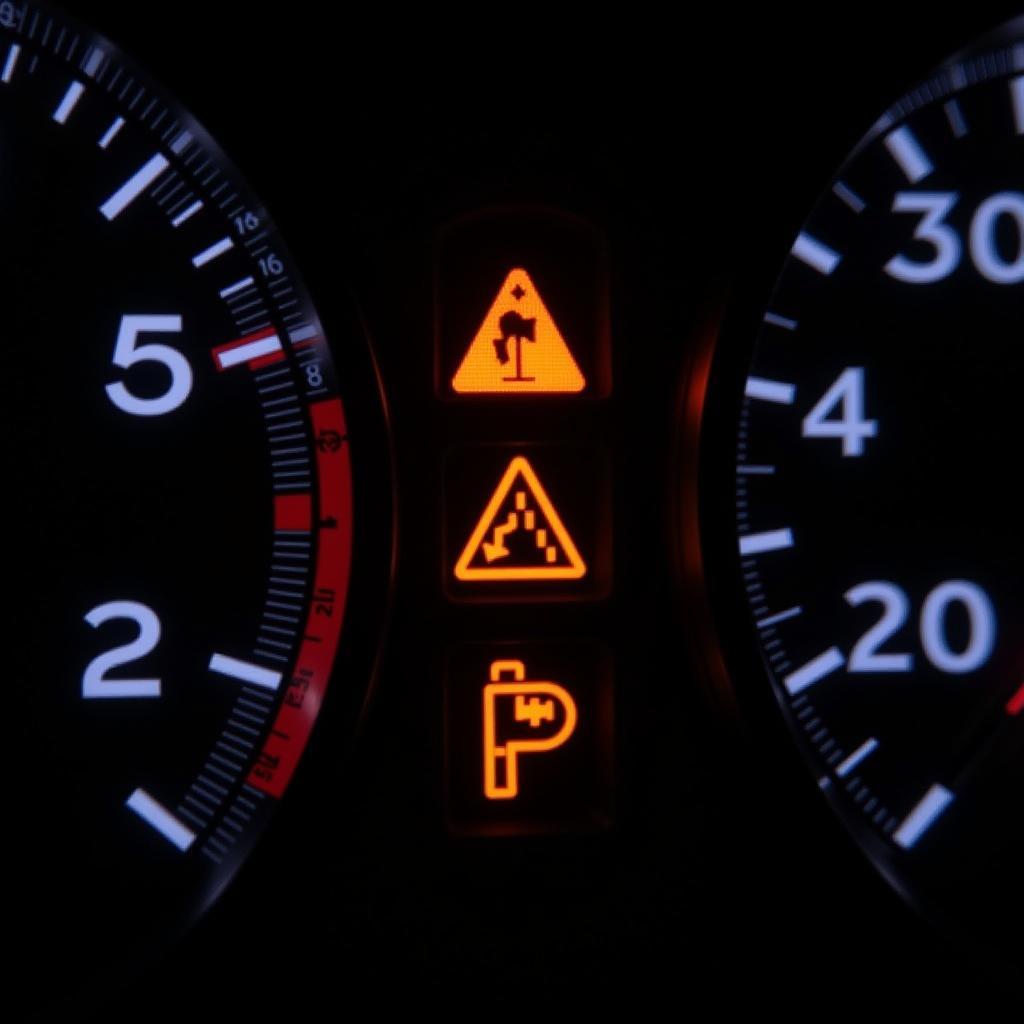A car diagnostic test, often referred to simply as a “diagnostic,” is like a window into the soul of your vehicle. It uses a specialized tool, a car diagnostic scanner, to communicate with your car’s computer system, retrieving valuable data about its health and performance. But what exactly can this test reveal, and why is it crucial for every car owner to understand its significance?
Unmasking the Mysteries: Understanding Car Diagnostic Tests
Think of your car’s computer system as its brain, constantly monitoring various systems and functions. This brain communicates through a network of sensors strategically placed throughout your vehicle. These sensors collect data on everything from engine temperature and fuel pressure to airbag deployment systems and emissions levels.
 Car Diagnostic Scanner in Action
Car Diagnostic Scanner in Action
When you experience car trouble, this data becomes invaluable. The car diagnostic test acts as the interpreter, translating the complex language of your car’s computer into understandable codes and information. Mechanics use this translated information to pinpoint issues and implement effective solutions.
What a Car Diagnostic Test Can Reveal
A single car diagnostic test can unlock a wealth of information, encompassing a wide range of systems and components within your vehicle. Here’s a breakdown of the key areas it sheds light on:
- Engine Performance: The heart of your car, the engine, relies on various sensors to ensure optimal performance. A diagnostic test can detect issues related to fuel delivery, ignition timing, air intake, and emissions control, helping identify problems like misfires, reduced power, or poor fuel economy.
- Transmission System: Responsible for seamless gear changes, the transmission system plays a crucial role in a smooth driving experience. The test can diagnose problems with gear shifting, slippage, and fluid pressure, which, if left unaddressed, can lead to costly repairs.
- Emissions System: With growing concerns about environmental impact, ensuring your car’s emissions system is in top shape is vital. The diagnostic test checks for issues with the catalytic converter, oxygen sensors, and evaporative emissions system, ensuring your car meets environmental standards and runs efficiently.
- Brake System: The importance of a functioning brake system cannot be overstated. A diagnostic test can identify problems with the anti-lock braking system (ABS), electronic brake distribution (EBD), and other brake components, ensuring your safety on the road.
- Safety Systems: Modern cars are equipped with various safety systems, including airbags, seatbelt pretensioners, and stability control. A diagnostic test can identify faults in these systems, ensuring they function correctly in critical situations.
 Dashboard Warning Lights Explained
Dashboard Warning Lights Explained
Beyond the Codes: Why Car Diagnostic Tests Matter
While a car diagnostic test primarily retrieves and interprets codes, its significance extends far beyond deciphering cryptic messages from your car’s computer. Here’s why it’s an indispensable tool for every car owner:
- Early Detection and Prevention: Regular diagnostic tests can identify minor issues before they escalate into major problems, saving you time, money, and potential headaches down the road.
- Accurate Diagnosis: By providing concrete data, diagnostic tests eliminate guesswork, leading to accurate diagnoses and targeted repairs. This saves you from unnecessary repairs and ensures you’re only addressing the actual problem.
- Improved Fuel Efficiency: Identifying and resolving issues with the engine, transmission, or emissions system can optimize fuel consumption, saving you money at the pump and reducing your carbon footprint.
- Enhanced Safety: By ensuring all safety systems are functioning optimally, diagnostic tests provide peace of mind, knowing that your car is equipped to protect you and your passengers in emergencies.
- Increased Resale Value: Regularly maintained vehicles with documented diagnostic tests hold higher resale value, as potential buyers perceive them as more reliable and well-cared for.
Do You Need a Car Diagnostic Test?
Several signs indicate the need for a car diagnostic test. These include:
- Illuminated Check Engine Light: This is the most obvious sign. While it might not always indicate a serious problem, it’s crucial to have it checked to understand the underlying issue.
- Unusual Noises: Strange noises like knocking, grinding, clicking, or hissing from the engine or other parts can signify potential problems requiring diagnosis.
- Performance Issues: If you experience reduced fuel efficiency, loss of power, rough idling, or difficulty starting, a diagnostic test can pinpoint the cause.
- Warning Lights: Besides the check engine light, other warning lights on your dashboard, like the ABS or airbag warning light, warrant a diagnostic test.
If you’re experiencing any of these signs, it’s essential to consult a qualified mechanic who can perform a thorough car diagnostic test. Early detection and diagnosis can save you significant time, money, and potential headaches down the line.
Want to learn more about how to run a diagnostic on your car yourself? Check out our comprehensive guide: how do i run a diagnostic on my car.
Understanding Car Diagnostic Test Results
Once the test is complete, the scanner will display a series of codes. These codes, often alphanumeric, correspond to specific issues within your car’s systems. While it might be tempting to search for these codes online and attempt DIY repairs, it’s crucial to remember that codes alone don’t tell the whole story.
 Mechanic Explaining Diagnostic Results
Mechanic Explaining Diagnostic Results
A qualified mechanic possesses the knowledge and experience to interpret these codes accurately, taking into account various factors like your car’s make, model, age, and service history. They can differentiate between symptoms and root causes, ensuring that the correct repairs are performed.
For instance, a code related to a misfire might indicate a faulty spark plug, but it could also stem from a problem with the ignition coil, fuel injector, or even a vacuum leak. A mechanic can investigate further, performing additional tests and inspections to pinpoint the exact cause and recommend the most effective solution.
Choosing the Right Diagnostic Tool and Service
The accuracy and depth of information provided by a car diagnostic test depend significantly on the quality of the diagnostic tool used. While basic OBD-II scanners are readily available for DIY enthusiasts, professional-grade tools offer advanced features and capabilities, providing a more comprehensive analysis of your car’s systems.
When choosing a mechanic for your car diagnostic test, it’s crucial to opt for a reputable and experienced professional who utilizes high-quality diagnostic equipment. Ask about their experience, certifications, and the type of scanner they use. A thorough mechanic will take the time to explain the results in detail, answer your questions, and provide a clear plan for any necessary repairs.
Understanding the ins and outs of car diagnostic tests empowers you as a car owner. It allows you to make informed decisions about your vehicle’s maintenance and repairs, saving you time, money, and potential frustration in the long run.
Curious about the different types of car diagnostic tools available? We’ve got you covered! Explore our guide on the what is the best diagnostic tool for cars.
Conclusion
A car diagnostic test is an invaluable tool for understanding your vehicle’s health, enabling early detection of issues, accurate diagnoses, and ultimately, a smoother and safer driving experience.
By understanding what a car diagnostic test can tell you, recognizing the signs that indicate its need, and choosing the right professional for the job, you’re taking proactive steps towards ensuring your car’s longevity, performance, and your peace of mind on the road.
Remember, knowledge is power when it comes to car maintenance, and a car diagnostic test is your key to unlocking that power.

Leave a Reply